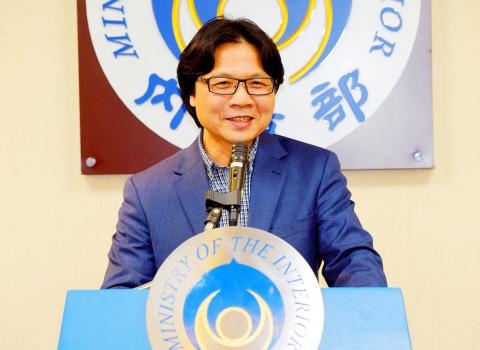Minister of the Interior Yeh Jiunn-rong (葉俊榮) yesterday denied allegations made earlier in the day by Chinese Nationalist Party (KMT) member Yu Shu-hui (游淑慧) that he had illegally taught in the People’s Republic of China (PRC).
Yu, who is running for a Taipei City Council seat, wrote on Facebook that Yeh had broken the law by teaching at Zhejiang University’s Guanhua Law School in December 2011 and January 2012, attaching a screenshot of the university’s Web site describing Yeh as a lecturer.
Yeh held a noontime news conference at the Ministry of the Interior, saying while he did give lectures in China, he did not receive compensation, which is in compliance with the law.

Photo: Huang Yao-cheng, Taipei Times
Yeh said he was a full-time National Taiwan University professor when he received an invitation from the law school’s then-vice president Zhu Xinli (朱新力) asking him to give lectures to Zhu’s “Government Regulations and Administrative Rule of Law” class.
Since he received no payment for the lectures and Zhu was the course instructor, nothing he did met the legal definition of part-time work, Yeh said.
“Everything was done strictly according to the law,” he said.
His only activities in China that resembled Yu’s allegations were the lectures in Zhejiang, though he has given talks on environmental regulations on several occasions, but all of those speaking engagements were short-term, Yeh said.
The university Web page describing him as a lecturer does not mean he was a part of the institution’s faculty and he has asked the university to take the page down to avoid further misunderstandings, Yeh said.
“As an academic, I believe in the advantages of global academic dialogue, including exchanges with China,” he said.
“While there are special circumstances across the [Taiwan] Strait, the nation has laws and regulations in place to govern [issues related to China], and I have followed them in all of my speaking engagements and short-term lectureships there,” he said.
When a reporter asked Yeh to respond to Yu’s comment that the government is guilty of double standards in stalling confirmation on National Taiwan University president-elect Kuan Chung-ming’s (管中閔) appointment while ignoring his alleged wrongdoings, Yeh said: “I am glad to have the opportunity to share with the public how international academic exchange is regulated. This is the first time I learned of this comparison and I am quite surprised. I want to clear this up as soon as possible.”

DAREDEVIL: Honnold said it had always been a dream of his to climb Taipei 101, while a Netflix producer said the skyscraper was ‘a real icon of this country’ US climber Alex Honnold yesterday took on Taiwan’s tallest building, becoming the first person to scale Taipei 101 without a rope, harness or safety net. Hundreds of spectators gathered at the base of the 101-story skyscraper to watch Honnold, 40, embark on his daredevil feat, which was also broadcast live on Netflix. Dressed in a red T-shirt and yellow custom-made climbing shoes, Honnold swiftly moved up the southeast face of the glass and steel building. At one point, he stepped onto a platform midway up to wave down at fans and onlookers who were taking photos. People watching from inside

A Vietnamese migrant worker yesterday won NT$12 million (US$379,627) on a Lunar New Year scratch card in Kaohsiung as part of Taiwan Lottery Co’s (台灣彩券) “NT$12 Million Grand Fortune” (1200萬大吉利) game. The man was the first top-prize winner of the new game launched on Jan. 6 to mark the Lunar New Year. Three Vietnamese migrant workers visited a Taiwan Lottery shop on Xinyue Street in Kaohsiung’s Gangshan District (崗山), a store representative said. The player bought multiple tickets and, after winning nothing, held the final lottery ticket in one hand and rubbed the store’s statue of the Maitreya Buddha’s belly with the other,

‘COMMITTED TO DETERRENCE’: Washington would stand by its allies, but it can only help as much as countries help themselves, Raymond Greene said The US is committed to deterrence in the first island chain, but it should not bear the burden alone, as “freedom is not free,” American Institute in Taiwan Director Raymond Greene said in a speech at the Institute for National Defense and Security Research’s “Strengthening Resilience: Defense as the Engine of Development” seminar in Taipei yesterday. In the speech, titled “Investing Together and a Secure and Prosperous Future,” Greene highlighted the contributions of US President Donald Trump’s administration to Taiwan’s defense efforts, including the establishment of supply chains for drones and autonomous systems, offers of security assistance and the expansion of

STREAMLINED: The dedicated funding would allow the US to transfer equipment to Taiwan when needed and order upgraded replacements for stockpiles, a source said The US House of Representatives on Thursday passed a defense appropriations bill totaling US$838.7 billion, of which US$1 billion is to be allocated to reinforcing security cooperation with Taiwan and US$150 million to replace defense articles provided to the nation. These are part of the Consolidated Appropriation Act, which the US House yesterday passed with 341 votes in favor and 88 against. The act must be passed by the US Senate before Friday next week to avoid another government shutdown. The US House Committee on Appropriations on Monday unveiled the act, saying that it allocates US$1 billion for the Taiwan Security Cooperation Initiative